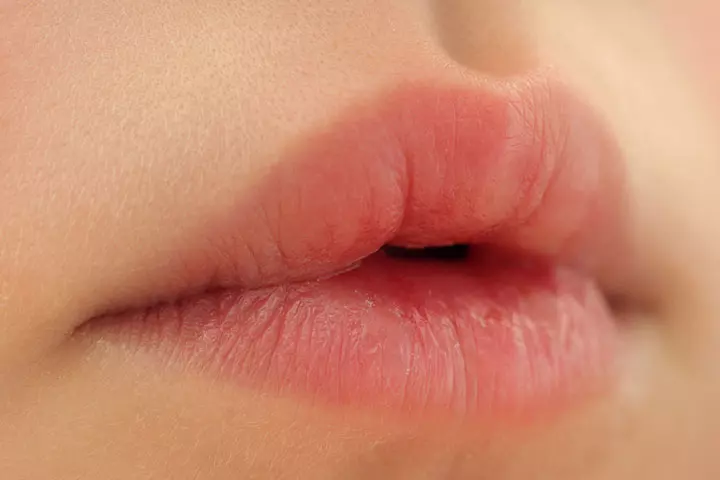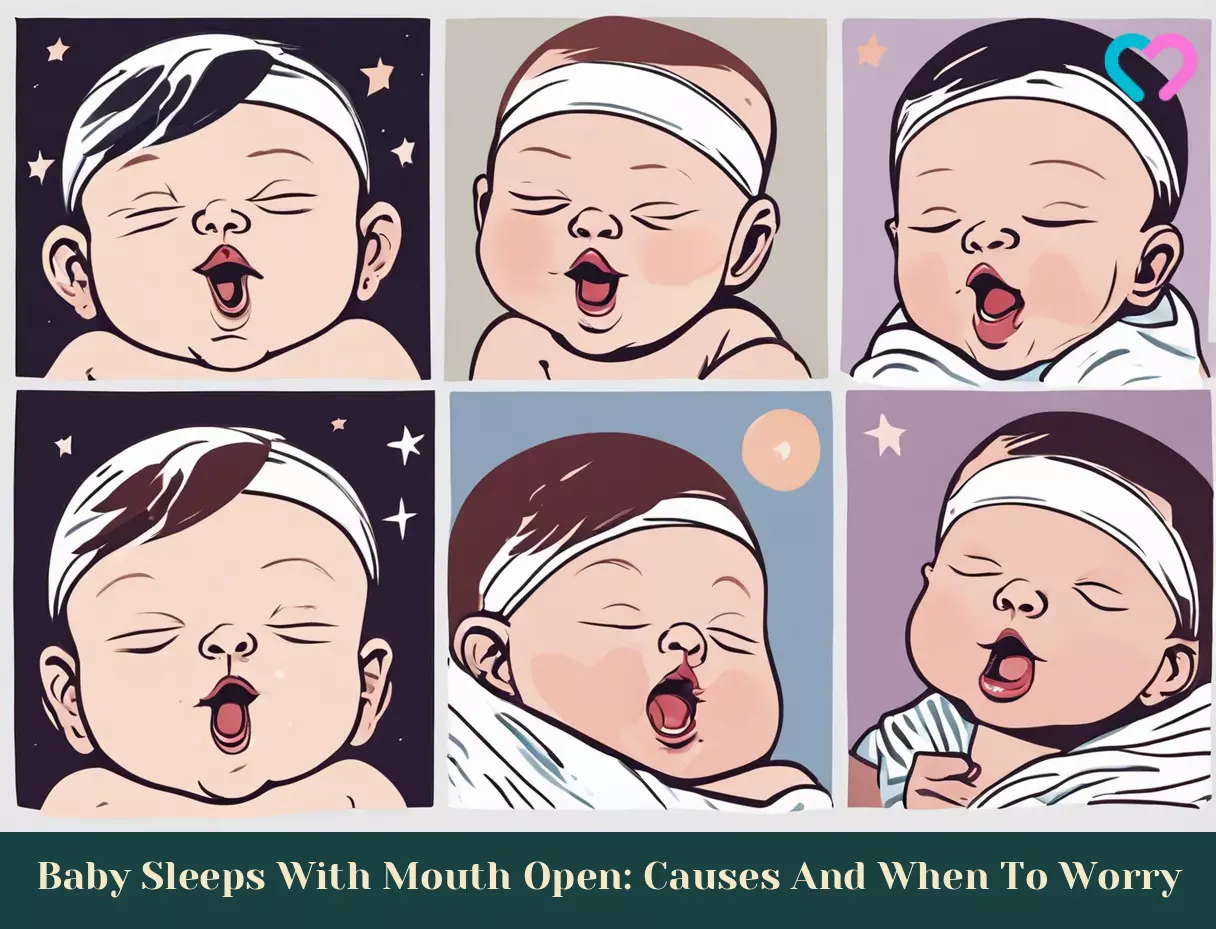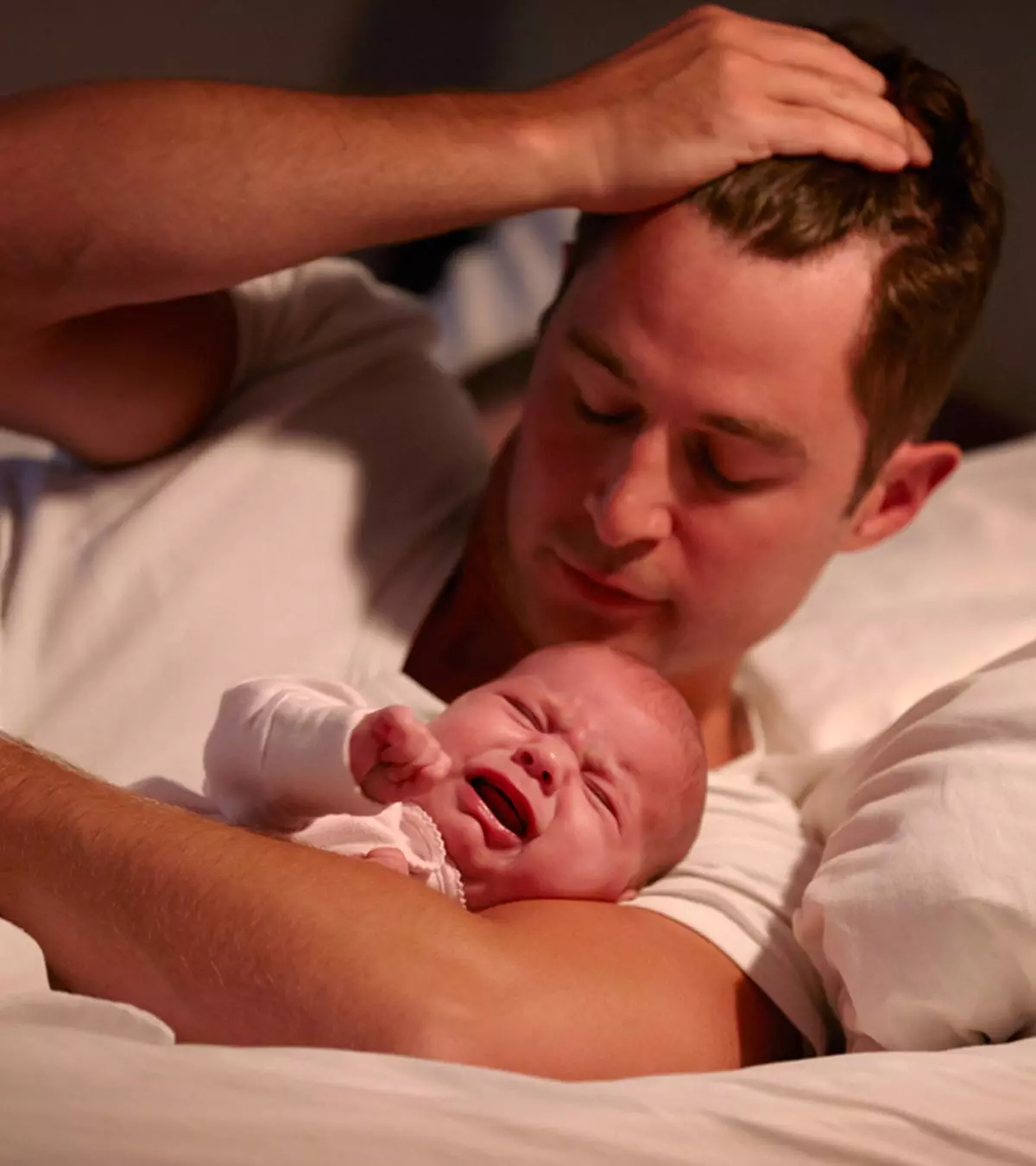
Image: Shutterstock
Parents and caregivers may often examine the physical health of their babies when they nap. It can be concerning if the baby sleeps with their mouth open. Babies sleeping with open mouths may breathe through their mouths, and it is not the natural way to breathe. Occasional mouth breathing is harmless. However, frequent mouth breathing can be a sign of underlying health conditions and breathing difficulties. You may seek a pediatric evaluation to know the causes and treatment for mouth breathing.
Read on to know why a baby sleeps with their mouth open and how to treat the underlying conditions.
Key Pointers
- Obstruction or blockage in nasal passages can cause babies to sleep with their mouths open.
- Mucus, sleep apnea, deviated septum, and allergies are common causes of nasal obstruction in babies.
- Sleeping with your mouth open can result in dry lips or mouth, exacerbating asthma, tongue thrusting, and facial changes.
Should You Be Worried If Your Baby Sleeps With An Open Mouth?
A newborn baby is not adept at breathing through their mouth (1). It takes a while for a baby to fully develop this survival reflexiAn infant’s involuntary muscle response to an external stimulation. . Therefore, if your baby is not breathing through their nose and doing so with their mouth, it could indicate an obstruction in their nasal passages and airways (2). Leaving it unattended for too long might affect the baby’s health.
 Quick fact
Quick factPossible Reasons Why A Baby Is Sleeping With Their Mouth Open
Mouth breathing may occur as a result of the following conditions.
1. Mucus

Image: IStock
Accumulation of mucus in your baby’s tiny nose could block the nostrils and make it hard to breathe. Since the baby cannot breathe through the nose, they start breathing from their mouth.
According to Dr. Steven Goudy, an Atlanta-based pediatric ENT, “If babies are breathing with their mouth open, it may mean that their nose is obstructed/blocked.”
2. Sleep apnea
Sleep apnea is a disorder in which the upper airways are obstructed due to various reasons, such as inflamed tonsilsiLumps of tissue on the back of the throat that support the immune system in fighting infections. , enlarged adenoids, or infection. A baby with this condition exhibits symptoms such as snoring, restless sleep, irregular breathing, and mouth breathing (3).
3. Deviated septum
A thin wall of tissue called nasal septum divides the nose into two separate nasal passages. When this septum is displaced to one side or deformed, it makes nasal breathing difficult. It can cause a baby to breathe through the mouth instead (4) (5). This development of deviated septum may occur during the fetal stage, causing some babies to be born with the condition (6).
4. Allergies

Image: Shutterstock
According to the National Center for Health Statistics (NCHS) 2021 data, about 27.2%, that is, over one-quarter of US children aged between 0 and 17 years, have at least one type of allergy – seasonal, food, or eczema. Allergies can cause excessive mucus production in babies, which can block your child’s nasal passages. You can try decongesting their nose with a nasal aspiratoriA manual or motor-controlled medical device that helps suction nasal secretions from the nose. to help them breathe through the nose.
5. Habit
Babies who experienced breathing ailments in the past may develop a habit of breathing through the mouth.
 Did you know?
Did you know?Consequences Of A Baby Sleeping With An Open Mouth
The following are some of the indicators and also the effects of your child sleeping with their mouth open.
1. Dry lips and mouth

Image: IStock
Breathing through the mouth causes saliva to evaporate quickly, thus making the lips and mouth dry. Babies who habitually snooze off with their mouths open are likely to have dry mouths and lips.
Dr. Goudy says, “The purpose of nasal breathing is to filter out any dust or other particles they are breathing in. Also, the nasal tissues humidify and warm the air they are breathing. During mouth breathing, these functions of nasal breathing disrupt and can lead to drier and colder air reaching the lower airways, which can cause irritation and coughing.”
2. Aggravated asthma
The nose filters irritants, dust, and pollutants. However, the mouth cannot perform these actions. Breathing through the mouth can cause potential allergens to reach the lungs, increasing the risk of an asthma attack in babies who already have the condition.
3. Tongue thrusting
Babies who are habitual mouth breathers may tend to push their tongue against the front teeth. This condition is called tongue thrust. Repeated mouth breathing could weaken the tongue and mouth muscles, leading to tongue thrust. It can eventually cause problems such as misaligned teeth, abnormal mouth posture, trouble chewing food, and even speech disorders (7).
4. Facial changes
Mouth breathing may interfere with the healthy development of the jaw and face muscles. It may lead to structural changes in the face, making it appear longer or narrower than usual.
5. Postural changes

Image: Shutterstock
In order to breathe easily, mouth breathers often tilt their head. This puts pressure on their pelvis, back, shoulders, and neck. It may lead to poor posture and may interfere with the healthy musculoskeletal development of the baby.
6. Behavioral changes
Research indicates that mouth breathing may cause sleep disorders, which in turn may lead to symptoms similar to those that occur in attention deficit hyperactivity disorder (ADHD)iA neurodevelopmental disorder affecting the child's ability to pay attention, control impulses, and manage energy levels. (8)
. Also, children with ADHD often experience sleep deprivation, which may also cause mouth breathing.
7. Lack of sleep and development
Babies grow in their sleep. If the baby breathes through the mouth during their slumber, likely, they may not be getting good-quality sleep. Lack of restorative sleep can affect the child’s growth, concentration, behavior, and overall development in the long run.
How To Prevent Your Baby From Sleeping With Their Mouth Open?
Here are some ways to help rid your baby of the habit of mouth breathing.
- Humidify the air: If excess mucus is what is causing difficulty in nasal breathing, get a cool-mist humidifier that will increase the moisture content in the air. This increased moisture could help decongest a stuffy nose and make nasal breathing easier.
- Give a warm bath: Giving babies a warm bath not only helps them relax but also clears out mucus collected in the nasal passages.
- Try saline water: If the mucus in your baby’s nose is too thick to drain out, try using saline drops that can help thin it so it can be sucked out easily. These drops are safe and can be used frequently.

Image: Shutterstock
- Frequent hydration: Feed adequate milk or formula to your baby to keep them hydrated. Sufficient liquid intake prevents dehydration and keeps the mucus flowing.
- Filter the air: The presence of allergens in the air could be the culprit for your baby’s allergies, which in turn could cause nasal obstruction and mouth breathing. Get an air filter that can improve the air quality and reduce the chances of mucus obstruction.
- Use a nasal syringe: You can use a nasal syringe that can help suck out the excess mucus from the baby’s nose. However, you need to exercise the utmost caution when using it since a baby’s nasal passages are delicate.
- Keep the surroundings clean: If you have pets at home, you must vacuum the house frequently to get rid of any pet hair. Keep the house clear of pet dander and other allergens.
 Caution
CautionWhen To See A Doctor
Most of the above-suggested remedies could help improve nasal breathing, thus negating the need for mouth breathing. If nothing seems to help, and you notice the baby gasp for air, or their mouth breathing interferes with feeding and sleeping, promptly see a pediatrician.
If you suspect your baby could be breathing from the mouth due to innate conditions, such as a deviated septum or sleep apnea, discuss it with a pediatrician. The doctor can perform various tests to determine the underlying cause of mouth breathing in the baby.
Babies grow constantly, and many habits of their infancy could slowly wane away by toddlerhood. A baby could eventually stop mouth breathing as they grow older. You can try some preventive steps at home to improve the baby’s condition. If nothing works, see a doctor. Parental supervision and regular doctor-checkup could mitigate the problems that lead to mouth breathing and help the baby grow healthily.
Frequently Asked Questions
1. What is open mouth syndrome?
Open mouth syndrome or posture is a permanent or nearly permanent facial appearance with an open mouth. Genetic conditions, including Aase-Smith syndrome,iA rare disorder of unknown origin identified by anemia, and joint and skeletal deformities. acrocallosal syndromeiA genetic condition characterized by brain abnormalities, extra fingers or toes, and typical facial features. , and Beck-Fahrner syndromeiA genetic disorder where the affected individuals may exhibit physical, behavioral, developmental, and neurological implications. , can be associated with open mouth posture. Certain cardiac anomalies, neurological conditions, and developmental delays can accompany an open mouth in young children (9).
2. At what age do babies breathe through their mouths?
Babies may breathe through their mouths from three to four months of age. Newborns and babies younger than two months of age are obligate nose breathers. They won’t have the skills to breathe through their mouths. A stuffy nose at this age can affect sleeping and feeding, and you may use home care measures and other techniques as directed by a pediatrician to clear the nose (10).
3. Is there a difference between a baby sleeping with their mouth open and an adult sleeping with their mouth open?
Babies have narrower nasal passages than adults and are obligate nasal breathers. So, if a baby’s nasal passages are congested or blocked, they may naturally open their mouth to compensate for the limited airflow. However, if an adult sleeps with their mouth open, they may do so for several underlying reasons, such as nasal congestion, habit, or sleep disorders like sleep apnea. It is worth noting that occasional mouth breathing during sleep is usually not a cause for concern. However, persistent or chronic mouth breathing may indicate an underlying issue that requires thorough evaluation and treatment.
4. Can mouth breathing affect my baby’s growth?
Yes, mouth breathing can impact your baby’s growth and development. When children consistently breathe through their mouth instead of their nose, it may lead to reduced growth hormone production. Research has shown that children who chronically breathe through the mouth may experience slower growth rates than nasal breathers (12).
Looking at a cute baby sleeping with the mouth open is a usual sight. However, some parents may be concerned about why their babies breathe through the mouth. While occasional mouth breathing is normal, if the baby’s breathing patterns seem abnormal or they persistently breathe through their mouth, you must get a medical evaluation done for them. It might sometimes indicate allergies, sleep apnea, or other underlying conditions. In addition, sleeping with the mouth open may lead to tongue thrusting, dry lips, or disturbed sleep.
Infographic: Rare Conditions Characterized By An Open Mouth
Witnessing your little one doze off is lovely, but not when they sleep with their mouths open too often. Although not always a reason to worry, in rare scenarios, babies may be born with syndromes that lead to an open mouth, besides other symptoms, as illustrated in the infographic below. Illustration: Momjunction Design Team
Illustration: Baby Sleeps With Mouth Open: Causes And When To Worry

Image: Stable Diffusion/MomJunction Design Team
References
1. Nasal Congestion (Infant/Toddler); Fairview
2. D.O. Rodenstein, N. Perlmutter, and D.C. Stanescu, Infants are not obligatory nasal breathers; NCBI
3. Suemy Cioffi Izu et al., Obstructive sleep apnea syndrome (OSAS) in mouth breathing children; NCBI
4. Septoplasty; U.S. National Library of Medicine
5. Kian Karimi, Is Your Nose Bent Out Of Shape? Maybe It’s A Deviated Nasal Septum; Pacific Neuroscience Institute
6. Deviated Septum in Children; Columbia University
7. What is a Tongue Thrust?; Intermountain Healthcare
8. Masahiro Sano et al., Increased oxygen load in the prefrontal cortex from mouth breathing: a vector-based near-infrared spectroscopy study; NCBI
9. Open Mouth; NCBI
10. Choanal Atresia; Minnesota Department of Health
11. Nilufer Nadaf et al Mouth Breathing-A Harmful Habit in a Young Child; ARC Journal of Forensic Science
12. Mario Morais-Almeida et al., Growth and mouth breathers; Jornal de Pediatria
13. Suctioning the Nose with a Bulb Syringe; Nationwide Children’s Hospital
Community Experiences
Join the conversation and become a part of our nurturing community! Share your stories, experiences, and insights to connect with fellow parents.
Read full bio of Dr. Wayne Hough
Read full bio of Dr. Ritika Shah
Read full bio of Rohit Garoo
Read full bio of Shinta Liz Sunny



















